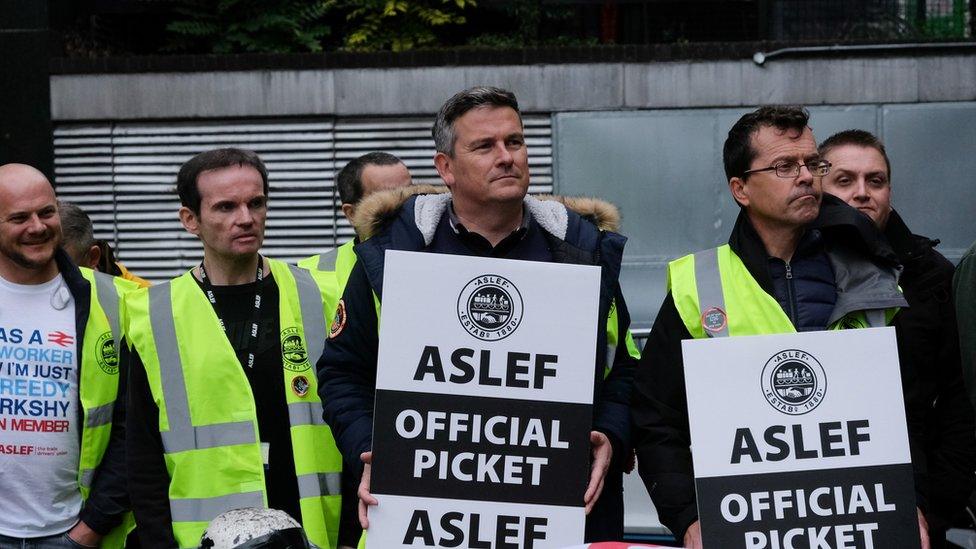Unions vow to fight plans to keep trains running
- Published
- comments

Unions have vowed to fight government plans to ensure minimum service levels on transport networks during strikes.
The RMT rail union described the government plans as "autocratic" while Aslef said they "won't work".
The government said the Transport Strikes Bill, which will be presented to MPs on Thursday, aims to avoid disruption from staff walkouts.
Prime Minister Liz Truss said UK transport users "should not be held to ransom".
There have been a series of rail strikes in recent months as unions have clashed with train firms, track operator Network Rail and the government over pay and conditions.
Further rail strikes are planned on 3, 5 and 7 November.
In response, the government is pressing ahead with legal moves to ensure minimum service levels during walkouts.
'Draconian'
The Department for Transport said the Transport Strikes Bill will mean:
A minimum service level must be in place during transport strikes - if this is not delivered, the unions will lose legal protections from damages
Employers will specify the number of staff required to meet an adequate service level during strikes
Unions must take reasonable steps to ensure an appropriate number of specified workers still work on strike days
Specified workers who still take strike action will lose their protection from automatic unfair dismissal.
But the Unite union called it a "predictable attack" on unions and workers' right to fair pay.
The RMT called the Bill "anti union" and "draconian", saying it would effectively outlaw legal industrial action.
Aslef - which represents 96% of train drivers in Great Britain - said the Bill, if passed into law, would only lead to strikes "lasting longer".
It added that the government's proposed minimum service levels were "a stupid idea".
"What happens when 100% of passengers try to get on 40% minimum service level trains?" said its general secretary, Mick Whelan.
'Held to ransom'
The government, which says strikes in June cost the economy £100m, said its plan would limit unions' "ability to paralyse our economy".
It added that details of the minimum service levels would be set out after a public consultation.
Transport Secretary Anne-Marie Trevelyan said: "Strikes have affected nearly all of us over this last year - whether that means losing out on a day's pay at work, having to close your business, missing vital medical appointments or stopping our children from getting to school.
"It is vital that public transport users have some continuity of service to keep Britain moving and growing."
On Wednesday, RMT announced its latest round of strikes for early November. Only 20% of usual services will run with the disruption likely to spill over into non-strike days.
Labour's shadow transport secretary Louise Haigh said: "Instead of attacking working people, ministers should finally do the job of a responsible government, get around the table and find a resolution to this dispute."
Related topics
- Published19 October 2022